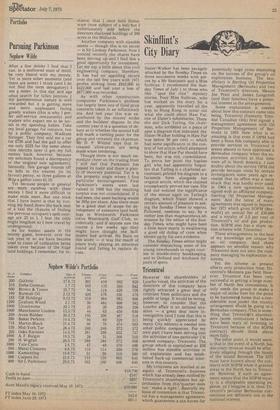Skinflint's City Diary
Slater/Walker has been Savagely attacked by the Sunday Times on three successive weeks with pieces by a Mr Searjeant and a Miss Sullivan. I recommend the Sunday Times of July 1 to those who like "spot the clue" mystery stories. Poor Miss Sullivan, who has worked on the story for a year, apparently travelled all the way to Hong Kong to scour out what she could about Haw Par, one of Slater's subsidiaries. There she met Dick Tarling, the chairman, who scribbled on a piece of aper a diagram that indicated the Slater/Walker holding in Haw Par was below 50 per cent — which had some significance in the context of her article,which attempted to show that Haw Par should have been, but was not, consolidated. To prove her point the hapless girl, who had apparently forgotten that Tarling is a chartered accountant, printed his diagram in a facsimile form alongside her original article, which she claimed triumphantly proved her case. She had not noticed the significance of the minus signs on Tarling's diagram, which Slater showed a certain amount of pleasure in asking the Sunday Times to reprint. Followed, needless to say, by a rather less than magnanimous admission by the editor of the Sunday Times, who might have been a little more manly in swallowing a good old dollop of crow when shown up by his own evidence.
The Sunday Times editor might, consider dispatching some of his young newshounds to night cour• ses in double-entry bookkeeping and to Dolland and Aitchison for pairs of specs.
Tricentrol
However the shareholders of Lonrho voted, the activities of the directors of this company have rightly attracted a great deal of criticism from politicians and the public at large. It would be wrong, however, to consider that the Lonrho affair is an isolated situation — a great deal more investigation (and I note that this is being quickly appreciated by many City editors) is needed into other public companies. For my own part I have been delving into the activities of one particular UK quoted company, Tricentrol. The group which is capitalised at £26 million has sizeable activities in oil exploration and has established back-up commercial interests in this country.
My criticisms are levelled at an aspect of Tricentrol's business which has already been ratified by Tricentrol's shareholders but approbation from •thiequarter does not 'make a right '. Basically my bone of contention is that Tricentrol has a management agreement which guarantees a tax-haven for
potentially large sums depending on the success of the group's oil exploration business. The beneficiary is Sterling Oil Properties Management (Bermuda) and two of Tricentrol's directors, Messrs Joe Pratt and James Longcroft (and their families) have a potential interest in the arrangements.
Some explanation is needed about how this contract came into being. Tricentrol (formerly Trinidad Canadian Oils) first signed a management agreement with Oil Properties Management of Bermuda in 1959. Now what is so amazing is that even if OPM had been a bona fide company able to provide services to Tricentrol it seems absurd to have appointed a . Bermudan company when the exploration activities at that time were all in North America. 1 cast doubts about the service OPM did provide because visits by certain investigators some years ago revealed that its office was a mere shack that was hardly ever used. In 1964 a new agreement was signed with an affiliated company, Sterling Oil Properties Management. And the latest of many agreements was signed in September 1971 which gives SOPM (Bermuda) an annual fee of £30,000 and a royalty of 2.5 per cent of Tricentrol's oil and gas production. SOPM also has a share option scheme with Tricentrol.
These arrangements to the best of my knowledge are unique for an oil company. And thei-e appears no sensible reason why Tricentrol does not own the company managing its exploration interests.
Yet the scheme at present affects only production from Tricentrol's Montana gas field. However, Tricentrol has been very successful in getting a large number of North Sea' concessions. It only needs the group to make a major oil strike here for the point to be hammere# home that a considerable sum lunder the royalty arrangement would be going to a Bermudan companyiThis is something that Tricentrol's shareholders (some institutions I believe have been wary of investing in Tricentrol because of the SOPM contract) should think about more fully. The other point, it would seem, is that in the event of a North Sea discovery revenue would be effectively slipping through the hands of the Inland Revenue. The DTI must have known about the contracts with SOPM when it granted areas in the North Sea to Tricentrot. However, if such an agreement means that the SOPM royalty is a chargeable operating expense, as I imagine jt is, then Tricentrol's peculiar Bermudan connections are definitely not in the national interest.












































 Previous page
Previous page